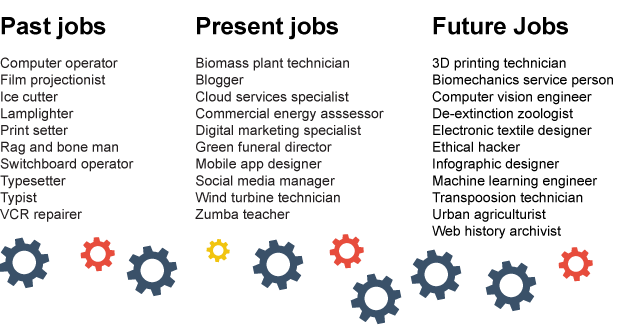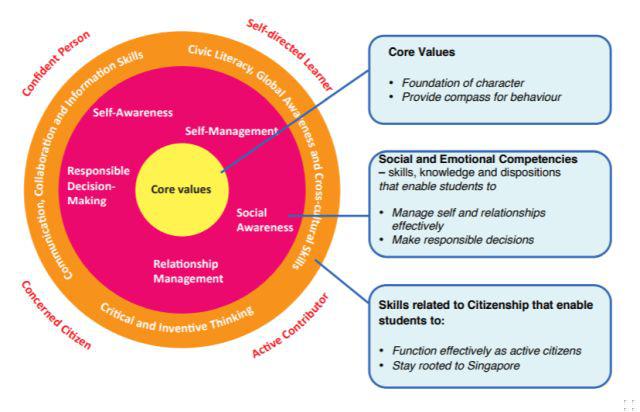21st Century Competencies and STEM Education
21st Century Competencies and STEM Education
Author: Prof Ng Tai Kai

Image via https://www.pexels.com
The Problem – A Fast-changing Human Society
The terms ‘21st Century Competencies’ and ‘STEM (Science, Technology, Engineering and Mathematics) Education’ have become very common themes in discussion/planning of future school education nowadays. The background behind the terms is that the human world is now undergoing a revolutionary change driven by advances in technology compared with the last century. These changes have already been reflected in the global job market where the required kind of job and corresponding job skills have been changing in many different job areas in the past decade. As an example, the tables below summarise some of these changes.


These changes are going to have a profound impact on education. They are not going about only changing our teaching methodology, but also the way we think about education.
To understand these changes, we first look back at the human society in the 19th – 20th century, i.e. the era after the industrial revolution. The industrial revolution is characterised by specialisation and division of labour. Specialisation leads to a huge increase in productivity in this era and individual human beings were trained as professionals in specialised areas like engineers, lawyers, accountants, medical doctors, factory workers, etc. As a result, knowledge specialisation became the main direction of education in the 19th-20th century.
With the advances in technology, the 21st century represents a new era where human society is undergoing rapid changes again. Many existing jobs are vanishing because of advances in technology and the major problems we face nowadays are often global problems not solvable by any single area of expertise. The ability of human beings to tackle problems that requires an integration of knowledge across different areas and working with people possessing different expertise is the most needed skill (or competency) in the 21st century. We note this requires a much higher level of cognitive skills compared with what is needed in the 19th-20th century where acquiring knowledge/skill in a single area is sufficient for success.
STEM Expert and STEM Education
A person is not considered to be a STEM expert nowadays if he/she has good examination scores in separate subjects of Science, Technology, Engineering and Mathematics but does not know how to integrate this knowledge or work with one’s expertise in different areas to solve a real-life problem. In this sense, STEM represents an integration of knowledge for the 21st century competency driven by technological advances. The integration is not restricted to the above 4 individual subjects since real-life problems often require wider expertise other than Science, Technology, Engineering and Mathematics.
Besides the integration of existing knowledge, the advance in technology also gives rise to important new elements in education.
- New knowledge areas related to advances in technology are generated; for example, AI-related areas like coding, machine intelligence, and big data or area related to biotechnology.
- Literacy in science and technology (or STEM literacy) becomes important for everyone. The dependence of human society on new, automated technology will increase rapidly in the coming 10-20 years. Everyone should acquire a minimum level of STEM-literacy to be able to understand and effectively use these new technologies to survive in the future world.
- The new technology provides opportunities for people to become successful by inventing new, useful applications of technology. Facebook, Ali baba are examples of successful companies building on technologies initially invented by others. To educators, the question is: how can we teach our students to become creative, successful entrepreneurs in this new, STEM era?
Beyond Technology
The 21st Century competency goes beyond learning new science and technology. The key concern is how should we prepare our society/city/country to respond to these changes. The figure below summarizes the 21st century competency envisioned in Singapore. The required 21st Century competency in many other countries shows a similar structure.
We note that the core of the 21st Century competency is about nurturing Values and self-management, followed by Social and Emotional Competencies, or how do we respond to peoples surrounding us. The cognitive skills including the popular 3C’s (Critical Thinking, Communication and Collaboration) are at the outermost layer.

Source: https://beta.moe.gov.sg/education-in-SG/21st-century-competencies/
If you compare this with my previous article: How We Learn – An Introduction to Recent Education Psychology Findings, you will realise that the 21st Century Competency actually starts with nurturing our ‘feeling’ mind as the core, and then gradually moves to our ‘thinking’ mind at the surface. The message is clear: to prepare ourselves for the rapidly changing 21st Century, it is important to prepare our ‘feeling’ mind first! This message is often overseen by educators because we are not used to working with our ‘feeling’ mind!
Examples: Value, social-emotional skills, empathy, etc.
The importance of preparing our ‘feeling’ mind for the coming of the 21st Century is quite easy to see. Many people have discussed the plausible ethical issues associated with new technology like faked news or human gene-editing and that our students need to have a well-formed set of ‘value’ to make the right decisions when facing these issues. Good social-emotional skills are needed if you are to work with people from diverse backgrounds. To be a successful entrepreneur it is important to understand the needs of human beings before asking the question of how technology can help to fulfil these needs. You also need creativity and an excellent self-regulated learning technique if you are to develop your own new idea. These are the important non-cognitive skills we need for the 21st Century.
Towards a New Education Model
An education model that addresses all these issues we are going to face should provide the following:
- A strong affective education programme that nurtures a healthy ‘feeling’ mind, including values, social-emotional skills, empathy, etc. to prepare our students for the upcoming technology-driven society
- Besides basic academic knowledge, the programme should provide a minimum STEM literacy for all students
- Learning opportunities that nurture the higher cognitive skills, including the integration of knowledge from different areas, a creative way of solving real-life problems, etc.
Writing down these requirements is just the first step. The real issue is: what does it imply to our existing education system?
The local school education system in Hong Kong is very strong in providing academic knowledge. In recent years it also started to provide quite a lot of STEM activities and learning opportunities that nurture higher cognitive skills, though the priority is relatively low because of the HKDSE. There is no systematic approach to affective education because schools are generally unaware of their importance. Nurturing the ‘feeling’ mind requires an environment that involves all teachers as students’ learning models or coaches to provides holistic, continual support for individual students (see my article on How We Learnt – An Introduction to Recent Education Psychology Findings). Affective education cannot be delivered in separate, formal classes which is the normal mode of operation in schools nowadays.
Nurturing 21st Century Competencies in accordance with the three targets/priorities I list above implies a complete disruption to the existing educational practices in local Hong Kong schools (including the public examination system which encourages students to look for ‘model answers’ and drives the schools’ teaching behaviour) and this is, I believe, the major challenge we face in Hong Kong when advocating for this new model of education.
On the other hand, the HKAGE is entering a new phase of development where ‘Talent Development’ will become a new goal of the HKAGE - meaning that we are going to build a systematic programme in selected areas that can help our gifted students’ to make significant progress in these areas and make a direct impact on their future study pathway. With its small size and flexibility in building its own programmes, we shall try to establish a new education model that incorporates the three listed elements for 21st Century Competencies. This is a new adventure for the HKAGE, and we need support from all our stakeholders to make this successful. As an example, I list in the Appendix my idea of how STEM education should look like.
Appendix: What is STEM Education?
In my opinion STEM education is about mindsets and skills and is more than teaching specific subject knowledge. It could be infused in different subject classes in the form of games, workshops, field trips, or projects to enable students to acquire the proper ‘STEM’ mindset and skills.
Specifically, we should prepare our students to:
- be versatile and be ready to use knowledge from different fields in solving problems.
- understand the importance of modern technology such as AI and biotechnology and how they are going to affect the long-term development of human society (including moral/ethical consideration on the application of technology).
- work in unfamiliar areas in collaboration with people they are not familiar with.
- think creativity and be ready to propose innovative solutions to real-life problems.
A basic STEM education programme should include
- Integration and Application of knowledge to real-life problems
There are two ‘basic principles’ behind the integration and application of knowledge to real-life problems under STEM:
The acquisition of knowledge is based on a scientific approach to learning, meaning that it should be evidence-based, the validity of the (integrated) knowledge should be tested/confirmed by cycles of experiments supplemented by rigorous logical deductions. Students should be trained to be curious and be always sceptical of (unconfirmed) knowledge, etc.
a) The application of knowledge to a real-life problem is based on a Design Thinking approach, where students should learn to (1) identify the ‘correct’ problem to be solved, and then (2) approach the solution through a cycle of activities including product design, testing solution, re-design for improvement, etc. Students should always be ready to look for solutions from an unfamiliar area of knowledge and are always ready to collaborate with others in solving a problem.
b) It should be cautioned that we look for hands-on works or solutions that go beyond paper drawing in STEM education. A solution should be tested in real-life before it is accepted. - A basic level of mathematics as mathematics is the ‘language’ for STEM
- Courses that provide updated knowledge on new technological developments - blockchain, big data, biotech, etc
For students who have interests in a STEM-related career, we should provide
- Solid foundation + Advanced courses in Science and Mathematics subjects
- Mentorship / research programmes for students to go in-depth into his/her area of interests
References (for all three articles):
- Kahneman, D. (2011). Thinking, Fast and Slow. Farrar, Straus and Giroux.
- Task Force on Review of School Curriculum. (2020). Report of Task Force on Review of School Curriculum. Education Bureau, HKSAR.
- Giger, M. (2007). The Three-Ring Conception of Giftedness. Schoolwide Enrichment Model (SEM). http://www.gigers.com/matthias/gifted/three_rings.html
- Borland, J.H. (2005). Gifted Education Without Gifted Children: The Case for No Conception of Giftedness. Cambridge University Press.
- Dweck, C.S. (2006). Mindset: The New Psychology of Success. Random House.
- Duckworth, A. (2016). Grit: The Power of Passion and Perseverance. Scribner.
- Fenton, N. (2015). 20 Psychological Principles That Will Help Your Students Learn More Effectively. American Psychological Association. http://psychlearningcurve.org/these-psychological-principles-will-help-your-students-learn-more-effectively/
- Kaufman, S.B. (2013). Ungifted: Intelligence Redefined. Basic Books.
- Mlodinow, L. (2012). Subliminal: How your Unconscious Mind Rules your Behaviour. Pantheon.






